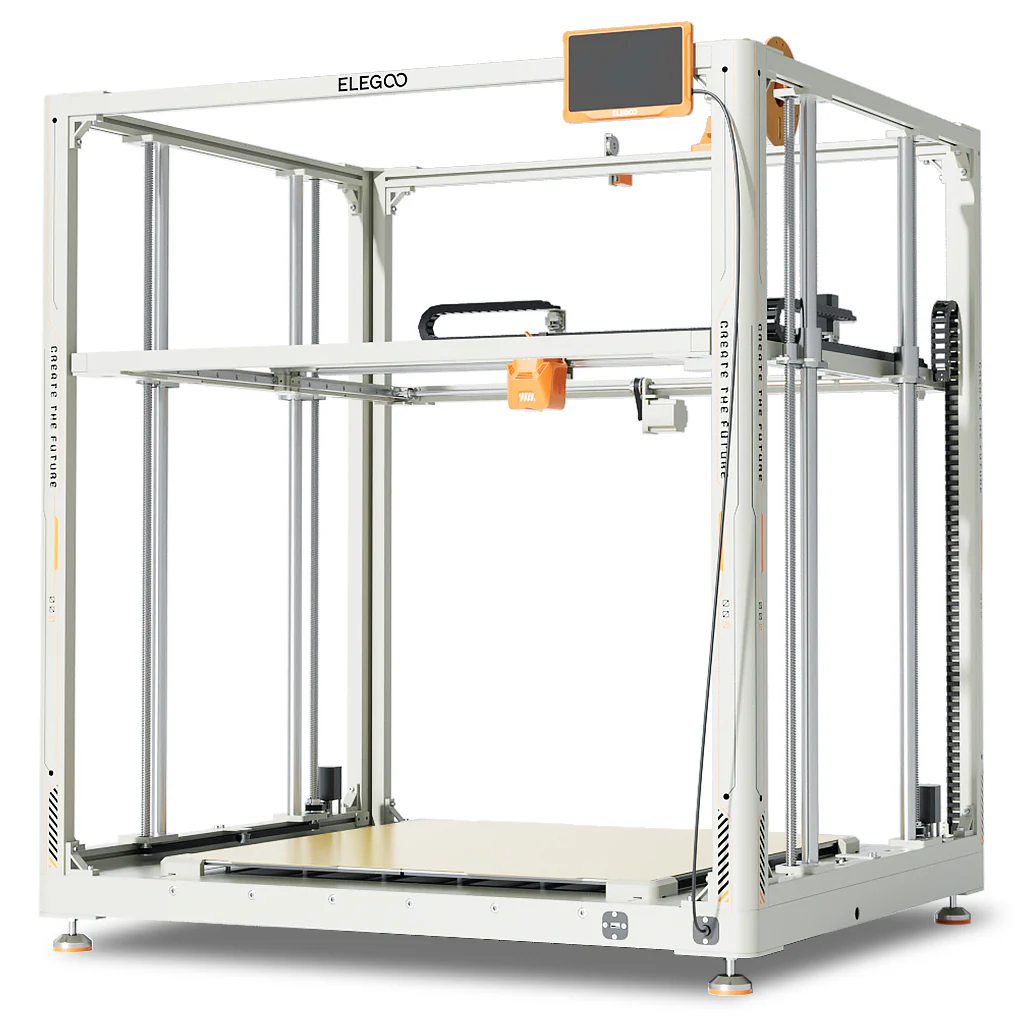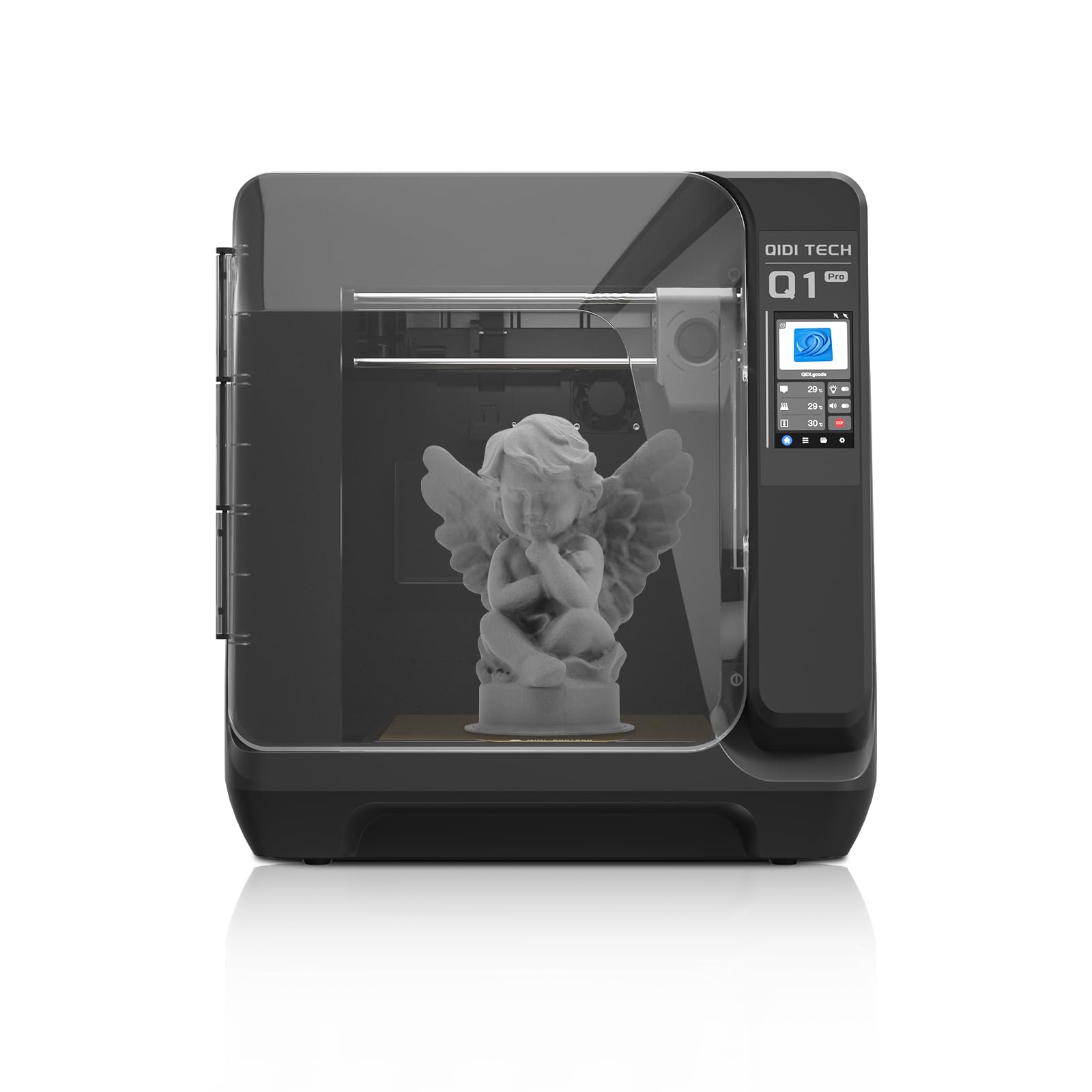Compare Orange Storm Giga vs Q1 PRO
Comparison between the best 3D printers
Choose the best 3D printer at the best price. The cheapest 3D printers are here.
Buy a 3D printer here with 3D Fila.
 |
 |
|
| Model | Orange Storm Giga[BUY Orange Storm Giga] |
Q1 PRO[BUY Q1 PRO] |
| Printing Material | Filament | Filament |
| Buy Filament for Elegoo Orange Storm Giga | Buy Filament forQIDI Q1 PRO | |
| Estimated price | $2500,00 | $449,00 |
| Manufacturer | Elegoo | QIDI |
| Release Year | 2024 | 2024 |
| Print Volume [mm] | 800x800x1000 | 245x245x245 |
| Printer Size [mm] | 1000x1000x1200 | 467x477x489 |
| Weight [kg] | 136 | 20 |
| Power Loss Recovery | YES | YES |
| Enclosed printer | NO | YES |
| Bed Leveling | Automatic | Automatic |
| Filament End Sensor | YES | YES |
| Bed type | Heated | Heated |
| Power supply system | Direct Drive | Direct Drive |
| Standard nozzle | 0,4 | 0,4 |
| Maximum Nozzle Temperature [°C] | 300 | 350 |
| Maximum Bed Temperature [°C] | 90 | 120 |
| Maximum printing speed [mm/s] | 300 | 600 |
| Filament holder | YES | YES |
| Camera for supervision | NO | NO |
| Recommended filaments | PLA, ABS< PETG, TPU | PLA、ABS、ASA、PETG、TPU、PC、PA、PA-CF、PET-CF、PAHT-CF etc. |
| Recommended slicers | Elegoo Cura | QIDI Slicer/Cura/Simplify 3D/ORCA/PRUSA Slicer |
| Maximum Resolution [mm] | 0,1 | 0,1 |
| Processor | Cortex-A53,64-bit Processor | |
| Display | Touchscreen 7'' | Touchscreen 4,3'' |
| Power Supply | 350 W | |
| Connectivity | USB, LAN, Wi-Fi | WiFi/USB Flash Drive/Ethernet Cable |
| Operating systems | Windows, Linux e Macbook | Windows, Linux, Macbook |
| Date of registration in the system | 2024-10-09 | 2024-07-09 |
| Release date | 2024 | 2024 |
| Extra features | The Elegoo Orange Storm Giga stands out for its huge print volume of 800 x 800 x 1000 mm and its modular heated bed system with four independent zones, ensuring energy efficiency. It supports printing with multiple nozzles, allows print recovery after power failures and uses Klipper firmware, optimizing speed and quality. The portable 7-inch touchscreen and USB, Wi-Fi and LAN connectivity make operation more accessible and versatile. | The QIDI Q1 Pro 3D printer stands out for its Core XY structure and heating chambers that reach up to 60ºC, ideal for advanced materials such as ABS and Nylon. It features Klipper firmware, an automatic leveling system, a high-flow extruder with a double metal nozzle and a hotend that reaches 350ºC. It offers connectivity via Wi-Fi, USB and Ethernet, as well as a 1080p camera for remote monitoring and an intuitive touchscreen for easy operation. |
| Support for multiple colors and materials (AMS and CFS) | NO | NO |
Notes * |
||
| Cost-benefit | 6 / 10 | 8 / 10 |
| Hardware | 3.2 / 10 | 4.8 / 10 |
| Tela | . | . |
| Print volume | 10 / 10 | 3 / 10 |
| Performance | 3 / 10 | 5 / 10 |
| [BUY Orange Storm Giga] | [BUY Q1 PRO] |
Conclusion |
| In comparing the Elegoo Orange Storm Giga and the QIDI Q1 Pro 3D printers, it is evident that each model caters to different needs and priorities of users. The Elegoo Orange Storm Giga, with its expansive print volume of 800 x 800 x 1000 mm, is ideal for those looking to produce large-scale prints. It features advanced functionality such as modular heating zones, Klipper firmware for optimized performance, and a portable touchscreen for user-friendly operation. However, its higher price point reflects its capabilities, and it may be more suited for professionals or enthusiasts who require significant printing capacity and versatility. On the other hand, the QIDI Q1 Pro, while considerably more affordable, does not compromise on functionality, boasting features tailored for advanced materials with its high-flow extruder and a maximum hotend temperature of 350°C. The printer's Core XY structure enhances its performance, particularly with engineering-grade filaments such as Nylon and ABS. Furthermore, its compact design and intuitive interface make it an excellent choice for hobbyists or small businesses seeking high-performance without overspending. In summary, if large volume printing is a priority and budget allows, the Elegoo Orange Storm Giga excels in both capacity and advanced functions. Conversely, for users seeking a cost-effective, high-performance 3D printer with versatile material capabilities, the QIDI Q1 Pro stands out as a strong contender. Ultimately, the choice will hinge on individual printing needs and budgetary considerations. |

